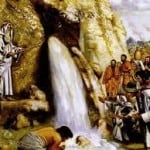 We read in the parsha the following account of the death of Miriam, the sister of Moshe, that Miriam”died there and was buried there” (Numbers 20:). The torah does not even offer even a minor description of the ensuing burial and mourning but immediately informs us that “there was no water for the people.” (Numbers 20:2)
We read in the parsha the following account of the death of Miriam, the sister of Moshe, that Miriam”died there and was buried there” (Numbers 20:). The torah does not even offer even a minor description of the ensuing burial and mourning but immediately informs us that “there was no water for the people.” (Numbers 20:2)
Our sages have taught that the children of Israel were afforded three gifts that were given to them in the merit of their leaders. These three special gifts were given to the Jewish people in the wilderness. The Divine clouds of Glory that surrounded and protected the people were given because of Aaron. The manna from Heaven was given because of Moshe and the “waters of the well” were gifted due to Miriam. Miriam merited that gift because she stood by the waters of the Nile watching over her baby brother in the basket. That source of waters ended when Miriam died.” and there was no water for the people.”(ibid)
As the people arrive at Kadesh at the edge of the Desert of Zin and discover the lack of water they cry out:
“If only we had died when our brethren died before G d! Why have you brought the congregation of G d to this desert, to die there, us and our cattle? Why have you taken us out of Egypt—to bring us to this evil place?” (ibid 20:4-5) Moshe receives instructions from G-d ““take the staff, and gather the people, you and Aaron your brother. And you shall speak to the rock before their eyes, and it will give its water.” ( ibid 20:8)
Moshe assembles the people and declares to them “Listen, rebellious ones! Shall we bring forth water for you from this rock?”( ibid 10) He then proceeds to hit the rock twice and waters flow out to quench the thirst and the fears of the people. HaShem then says to Moshe ““Because you did not believe in Me, to sanctify Me before the eyes of the Children of Israel, therefore, you will not bring this congregation into the land I have given them.”( ibid 12 )
What happened? What was it about Moshe’s misdeed that warranted such a hard and painful punishment? What is it simply because he hit the rock rather than speak to it?
The Ramban explains that Moshe hit the rock twice, which pointed perhaps to an uncontrolled fury in his actions .Rabeinu Chananel explains that Moshe’s comments prior to hitting the rock created a situation in which G-d’s name was not being sanctified “before the eyes of the children of Israel” .This is due to the fact that he said “Shall we bring forth water for you from this rock?“, rather than “shall G-d bring forth water”.
Maimonides (Shemona Perakim, Ch. 4) explains that the problem occurred due to anger. Moshe had lost his patience .It is possible that the lack of patience had something to do with the death of his sister Miriam. The older sibling who protected him and kept alive the Divine vision for his family and people died .Consequently Moshe was thrust into a period of pain and mourning.
We see no mention of the people mourning for Miriam . Instaed they came to complain. Moshe was angry and as a result he cried out “Now listen, you rebels,” .It is that outburst that brought about the opposite of sanctification. According to this approach of Maimonides , Moshe did not choose to hit the stone instead of speaking to it as he was commanded. He simply lost the ability to speak for G-d when he turned in anger towards the people .We have been taught that ” anyone who is angry , if he is a wise man his wisdom will leave him. If he is a prophet , his prophecy will leave him” ( tractate Pesachim 66b) He hit the stone rather than spoke to it because he lost the ability to hear and speak prophetically.
The children of Israel were about to enter the land of Promise. Yet this promise would be realized under the harsh glare of physical endeavors and experience .HaShem was slowly removing the obvious spiritual parameters of their existence in order to prepare them for their entry into the land . This would be a land wherein those parameters would have be found within their souls and experienced through their faith. The people now needed a leader who had come to terms with such a flawed world . They needed a leader who could continue to contend with the vagaries and failures of human nature. They needed a leader who would understand them and help them cope with their new reality .For it was to be a reality fraught with disappointments and yet rich with incredible potential.
Anger then was not the cause for the change but rather it was a symptom. Moshe’s anger was so real and understandable. Moshe had carried them through the wilderness in his arms. He had been patient and kind, Yet now he would now have to give them up into other hands. The people needed a different type of leadership.
The Talmud states “even if one was destined from on High for greatness, his status is lowered (Pesachim 66B)It is therefore terribly powerful and sobering to consider the damage and danger of “anger”. This is especially true as it regards our families, our friends and our people. One cannot even comprehend or compare oneself to the greatness and purity of Moshe’s loving and caring spirit.
Yet anger does what anger does.
Where then are we?
